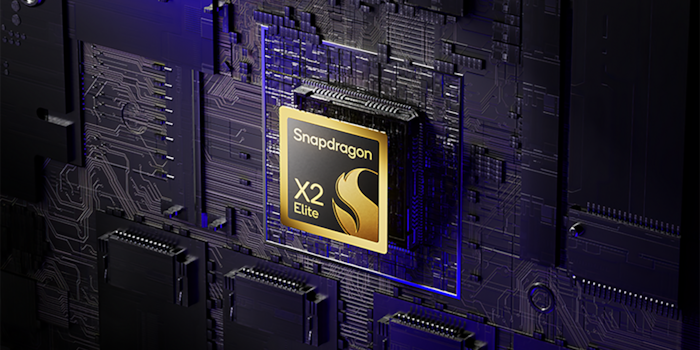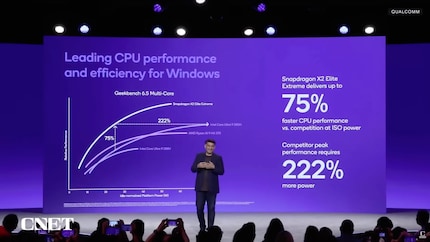
Qualcomm presents PC chips with allegedly groundbreaking efficiency
According to the manufacturer, the new Snapdragon X2 beats the top models from Intel and AMD by far. They should find their way into the first laptops in 2026.
Qualcomm presented the second generation of its ARM-based PC processors at the Snapdragon Summit: Snapdragon X2 Elite and X2 Elite Extreme. Both chips are based on the new third-generation Oryon CPU and are manufactured using the 3-nanometre process. The top-of-the-range X2 Elite Extreme model offers up to 18 cores, two of which clock at up to 5.0 gigahertz (GHz) - a new record for ARM processors in the PC sector.

Source: Qualcomm
Qualcomm promises up to 31 per cent more CPU performance and a 2.3-fold increase in GPU efficiency compared to the first generation of its laptop chips. The dedicated NPU achieves 80 TOPS and, according to the manufacturer, should offer the highest AI performance currently available in laptops.
In a direct comparison with current high-end chips from AMD (Ryzen AI 9 HX 370) and Intel (Core Ultra 9 285H/288V), Qualcomm claims up to 44 per cent more single-core and 75 per cent more multi-core performance with identical energy consumption. In terms of graphics performance, the manufacturer claims a 52 per cent advantage, but the competition requires almost twice as much energy. In AI benchmarks, the X2 Elite Extreme with its NPU even outperforms the Apple M4 and achieves 2.2 times its performance.

Source: Qualcomm
As always, manufacturers' performance figures should be treated with caution. The chips are designed to further improve battery life through their efficiency. Qualcomm speaks of «Multi-Day Battery Life». Concrete figures or independent benchmarks are not yet available. The first devices with the new Snapdragon processors are expected in the first half of 2026. Asus has been named as the first partner.
In a market comparison, it remains to be seen how the chips will perform in practice. While Qualcomm raises the bar in terms of efficiency and AI performance, software compatibility - for example with games and professional applications - remains a disadvantage compared to the x86 platforms from AMD and Intel and compared to Apple's M series.
My fingerprint often changes so drastically that my MacBook doesn't recognise it anymore. The reason? If I'm not clinging to a monitor or camera, I'm probably clinging to a rockface by the tips of my fingers.
From the latest iPhone to the return of 80s fashion. The editorial team will help you make sense of it all.
Show all